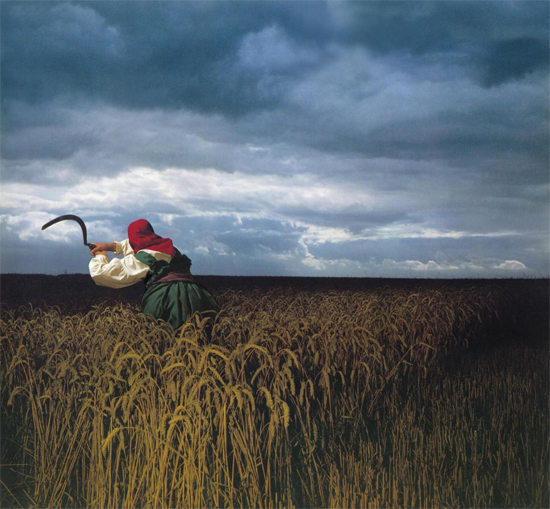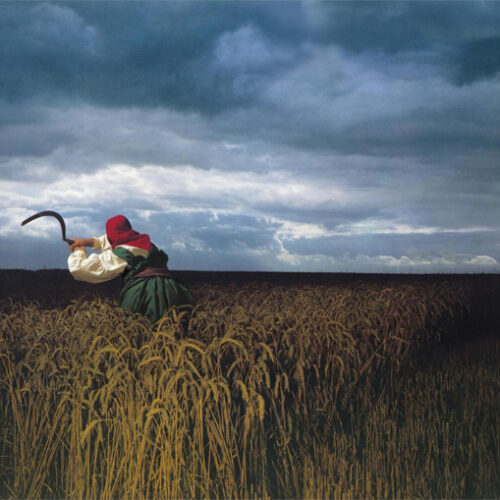"So we picked up our tools and we worked in the morning light. With the last stone placed, wasn’t it a wonderful sight? But it fell back down and scattered all around… My monument, it fell down" Depeche Mode – ‘Monument’
Early May, 2012. It’s an obscenely cold, grey day for springtime. The sky over Basildon is not too dissimilar to the cover picture of A Broken Frame, the second album of the town’s most famous – but locally unloved – sons, Depeche Mode. The image of a woman with her back to the viewer, using a scythe in a corn field under a dramatic sky, was provided by the photographer Brian Griffin, who had a model dressed as a Russian peasant pose in a cornfield near Duxford RAF Museum in Cambridge in September 1982, shortly before the record’s release.
Griffin, at the time, was influenced by the socialist realism of Soviet Russia, in particular Kazimir Malevich’s Reaper painting. Though probably not intentional, this pictorial nod to the art of the Iron Curtain slyly references the architecture of the band’s hometown. Basildon came into existence in 1949 when the Basildon Development Corporation was formed under the New Towns Act. As Sophia Deboick wrote for The Quietus last year: "Opposed by the villagers of Laindon, Pitsea, Dunton and Vange, Basildon New Town was the new socialist government’s vision of an engineered society, and its high-spending Labour Council, along with its brutalist architecture, led to Conservative Environment Secretary Patrick Jenkin dubbing it ‘Little Moscow on the Thames’."
It poured with rain on the day that Griffin took his photograph, but only drizzles in a non-committal manner as we wait in the car park of a snooker club for Deb Danahay, former girlfriend of Vince Clarke, to pick us up in a decommissioned Yazoo tour bus. She has organised the tour as one of the main attractions for fans attending the Bas II weekender, a festival that also comprises of memorabilia sale and a line-up of associated acts such as local, Depeche-influenced electro duo Basic, made up of Martin Gore’s nephews, Dean Oldfield and Louis Hyde.
The majority of the party waiting for the last bus of the day to pick them up are from – as you’d expect from obsessive ‘Mode fans – mainland Europe. Much has been made of the link between the European influence on the architecture of Basildon and the sound of Depeche Mode, and its greying, uncomplicated uniformity certainly seems familiar to the visitors. "Basildon looks like a very normal town," says Johannes, who has flown in from Hamburg with his wife. The couple travel all over Europe to see Depeche Mode live and attend events like this. "They could have come from Manchester, Birmingham or anywhere – that’s not important. Music is the important thing."
Vince Clarke left the band after recording only one album, Speak and Spell, and was in the early stages of his brief-yet-searing pop project with local gal Alison ‘Alf’ Moyet, Yazoo. While talking to Clarke and Martin Gore about their first musical collaboration since Vince walked out, VCMG, earlier this year for The Stool Pigeon, I gauged their opinions on their hometown. "My family moved to Basildon from South Woodford when I was five," said Vince. "There was absolutely nothing to do. When I was a kid there was just one Indian restaurant and one Chinese. Somebody asked me earlier why there were so many people from Basildon into music. I think that was the reason. If I hadn’t joined the band, I’d still be working at the yoghurt factory."
Clarke’s Essex history was typical, as was Gore’s, who was born and raised in Dagenham, his family moving to Basildon for work. Dave Gahan, who was born in Chigwell, reminisced about his Basildon bad boy past during a mid-80s interview. "I was pretty wild. I loved the excitement of nicking a motor, screeching off and being chased by the police. Hiding behind a wall with your heart beating gives you a real kick – will they get you?"
Our tour guide Steve Burton, an old friend and neighbour of Andy Fletcher’s in the Lee Chapel North area of Basildon, paints a wholly more idyllic picture of the childhood of the Depeche Mode clan. He fondly recalls the ritual of door-knocking on the way to Saturday morning pictures. He takes us to The Statues – public art being a staple of the New Town. "The Easter Island Statues of Lee Chapel North," he describes with a chuckle. "No one knows what they are or why they are here, but when you are eight years old they are fantastic because you can climb all over them." After The Statues, we arrive at "The Swings" – but, crucially, the swings are missing. Only the frame remains.
Next up is "The Square" – the shop that used to be known as "Green’s" but is now called Trinity Food & Wine. Steve shows us the wall where about 20 boys, including members of the band, would wait to collect local newspapers to deliver. He describes how lovely it used to be around here – "nobody messed about or stole anything". All you can see now are broken pavements, taking us from sepia tinge to the reality of New Towns decline during the era of privatisation. Over the cracked ground a kid powers past on a dirt bike.
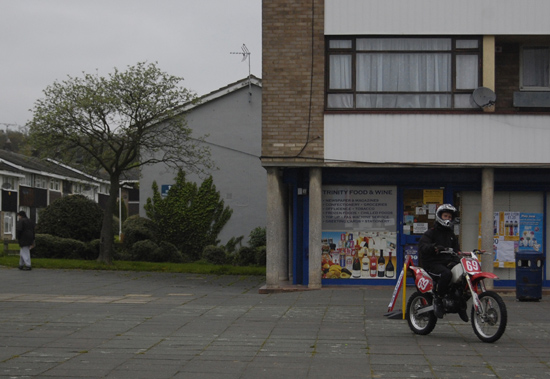
Basildon is best known these days as the supposed barometer of every government since 1979. David Cameron and Nick Clegg visited in March in a misjudged attempt to align themselves with the salt-of-the-earth stereotype, Essex Man. David Eldridge’s play In Basildon (on at the Royal Court earlier this year) dealt with the domestic fallout of an Essex family in mourning. Like a Mike Leigh play set in the creaking, now-not-so-new town, at its heart was the failed promise of Basildon, the lure of which began in post-war Britain during the dawn of the Welfare State.
In being a town of 100-odd-thousand that has only 60 years or so collective history, Basildon becomes a media totem of the ills of modernity, a greying embodiment of the "trouble with town planning". Yet much of the trouble came in the immediate loss of confidence to see the project through. Basildon was built at the behest of Essex County Coucil and Billericay District Council who campaigned after WWII for a New Town to be built in the Laindon-Pitsea area over the wild plotlands that had sprung up – shacks and bungalows built by emigrating Londoners but that did not have an infrastructure. Back then West Ham and East Ham were still Essex boroughs – and both saw a potential New Town as a place to ease the overpopulation of their areas. The idea of displacement was unpopular with those already living this more anarchic existence in the area. Questions were asked in parliament – does the land belong to the Government or the people?
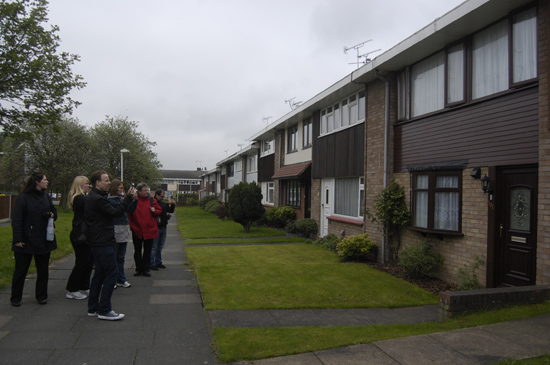
We arrive at "The Back", a line of garages round the back of Andy Fletcher’s house where they would play when they were younger. Steve and his mates would wait for Fletcher to come out. "We’d ask where he is and his Mum always said, ‘Up in the toilet.’ He used to have lots of comics and magazines he would read in there. We gave him a name, which is still used on stage by Dave Gahan when he introduces him. Andrew ‘Flush’ Fletcher. He was always in the loo, and we called him ‘Flush’ because he never did."
The group collapse into laughter and amazement at receiving a piece of information that they had not heard before. "I have never heard of it before!" "Great!"
Vince Clarke-era Depeche Mode was faintly audible from behind the garage door when we got to 55 Mynchens, where Vince once lived and where the band first used to practice with synths and headphones. "This is the place that Deb used to come to meet with Vince," says Steve, to more gasps and clicks of cameras.
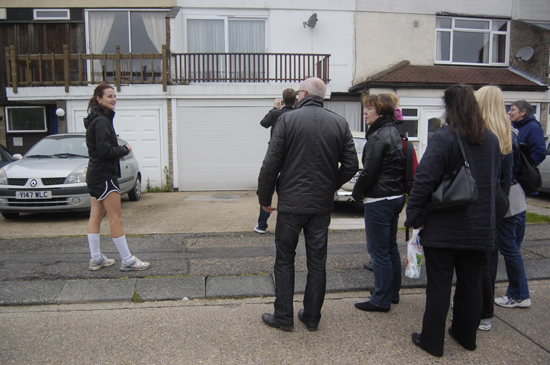
A bubbly neighbour in a sports kit pops out of her car and asks why we are all gawping at a garage door.
"I’m taking them on a little tour of the famous music places," Steve explains.
"Is this famous?"
"Is it famous?! Dear, oh dear! Vince Clarke, Erasure, Depeche Mode?"
"No… Who is it? I need to know! How long ago was that? I can’t believe I didn’t even know that. Enjoy your tour!"
"There you go – the next-door neighbour doesn’t know but everyone else in Germany does!" says Steve. The visiting Europeans chuckle and squeal in disbelief. Later they keep saying it’s "such a shame" that these neighbours don’t know their musical heritage. Steve offers up the phrase already used in Jeremy Deller and Nick Abraham’s film The Posters Came From the Walls: "A prophet is never welcome in his own town."
"I’ve told myself so many times before / But this time I think I mean it for sure / We have reached a full stop / Nothing’s gonna save us from the big drop / Reached our natural conclusion / Outlived the illusion" Depeche Mode, ‘Leave in Silence’
Another inspiration for Griffin’s image for the sleeve to A Broken Frame was the ruddy bucolic intensity of 19th century German romanticism. This must have gone down well with Martin Gore, who had looked longingly at Europe since a school exchange trip to Germany, during which he stayed on a farm in the country’s northernmost state, Schleswig-Holstein. Long before Depeche Mode started to become a full-time concern, Gore typified the southeast Essex suburban dreamer. An aspiring translator trapped in commuter job in a City bank, under-cultured for what his needs demanded, looking for a method of escaping the in-and-out reliance on London’s lucre (which would only get worse as the decade progressed under Thatcherite deregulation). Two years later in 1984 he would enact the now well-worn pilgrimage of the synth-inclined by moving to Berlin. But, as his band set out to try and put together a second album in 1982, the threat of the nine-to-five was rearing its head again.
Gore and the band were unsure if, without Clarke, they would ever have a hit record again. Alan Wilder was hired in his place – his first gig at Crocs in Rayleigh which is now the infamous goth/emo/alt-filled snakebite-lovers society The Pink Toothbrush – though he wasn’t credited on the album. Gore called upon pre-Depeche songs – some were written when he was 14, others a bit later with his band Norman and the Worms, some on the hoof in the studio. There are some quite cringey lines – "Anything passes / When you need glasses", from the otherwise effectively evocative ‘Monument’. Yet the band kept up its chart bothering. The understated ‘See You’, recorded in December 1981 and released in January 1982, was their biggest hit to date, charting at number six.
The album is Martin Gore’s least favourite, yet it is a curiously Basildonian document, and perhaps the most reflective of the area of all of Depeche Mode’s discography. It is the last of The Mode’s records that felt stuck in the capsule of family, of home, before the skitting rhythmic games and Neubauten-derived sound experimentation of Construction Time Again heralded a period of greater expansion.
Sometimes the record feels trapped, inconsequential – here and there it is cheesy. ‘A Photograph of You’ is like a watered-down Abba. Yet it is often marked by wide-eyed science-fiction dreaming (‘Nothing to Fear’) and an oddness, a darkness that brings up the drabness of the sky on days like today. The brilliant Fun Boy Three-meets-Culture Club track ‘Satellite’ is a suburban classic.
In a way, what A Broken Frame most strongly presents to the listener in hindsight is a band in transition; transition from place, from Basildon. Navigating the terrain that they had known collectively for most of their lives, while refusing to return to the mundane. The album before they reached out for the feeling of mass solidarity that made them a global success as highlighted in The Posters Came From The Walls.
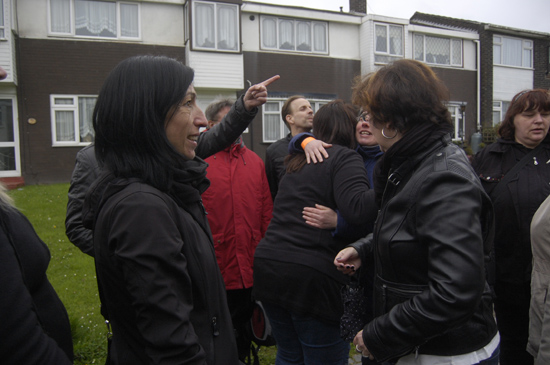
"Things must change / We must rearrange them / Or we’ll have to estrange them / All that I’m saying / The game’s not worth playing / Over and over again" Depeche Mode ‘The Sun & The Rainfall’
We board the bus again and are shuttled off to Vange, a village until it merged into the wider remit of "Basildon" in 1951, to meet Tim Williams, the band’s first photographer. "According to the biographies, I am Depeche Mode’s first ever number one fan, but I never thought about it like that at the time," he says. "A couple of friends had told me about this local synth band. I loved synth music, and was into Gary Numan and Ultravox. They were playing in pubs and clubs to 10-20 people. Because I was an amateur photographer, I started photographing them. People started writing to the fan club and asking for signed photographs – there weren’t any so Vince asked me do a photo session for the band. I was completely in awe even though they weren’t famous at the time – I thought they were going to be huge, they were my idols and I was only 17 years old. When they came to my workplace, I was shaking but said it was fine and tried to be really cool about it."
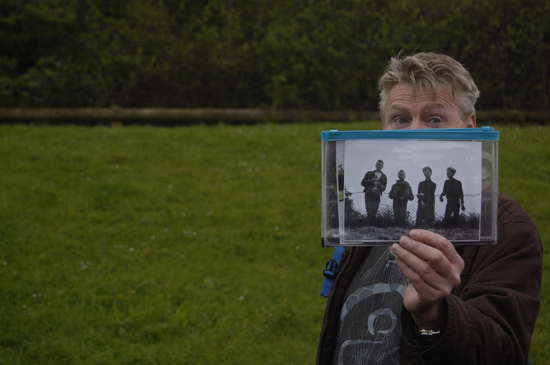
He shows us an unremarkable block of flats; another former home of Depeche Mode’s spectre, Vince Clarke, who once lived here with Danahay. "On Sunday 21st of June 1981, I came round in the afternoon," Williams recalls with alarming accuracy. "It was a beautiful sunny day. I went upstairs, the band were all there. Deb was there. Jo [Gahan] was there. Deb and Vince had been scraping wallpaper off the wall, there were piles of it all over the place. I asked Vince to sweep up the wallpaper so we could do a photo against this wall." He gestures towards a laminated photograph he is passing around. "This is the only surviving photograph from that day." Vince is pulling a ‘too cool for school’ kind of face. "In so many of the photographs three members are looking at the camera and it is nearly always Vince who won’t play the game, being mean and moody."
We walk to the top of Vange Hill. Tim holds another laminated photograph – the first picture that the band sent to their fans – and points out the foliage behind them that has grown since then.
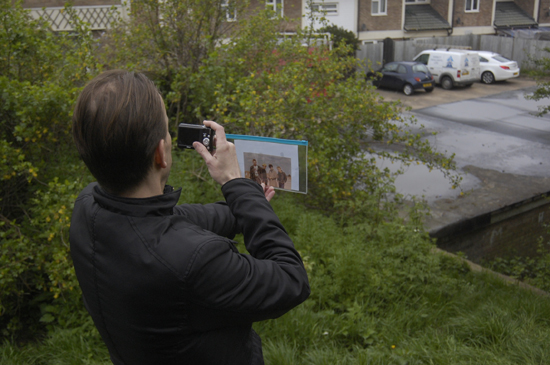
You can’t ignore the metaphorical power of this vantage point on Vange Hill, over the flatlands of the estuary and beyond that, the Thames, the river that acts as a gateway, an exit, to the rest of the world.
West of here was once Dunton, a group of plotlands that made way for the erection of Basildon – areas with such names as Gumboot Hill; Dodge City. They were deemed out of control by the authorities: 25,000 people had ended up starting new lives there, without sewers or proper roads or running water. What characterises Dunton now is the Dunton Hills Family Golf Centre, yet its history is closer to the Dale Farm site that was so publicly smashed to bits last year.
In the days that followed, there was no coverage of the Bas II festival bus tour, aside from this report in the local paper, the Evening Echo, the publication that Andy Coulson, whose trial for phone hacking has been set for September 2013, started his career in the mid-80s. It was as if this area’s former life of rural anarchy had returned for one more tabloid-friendly hurrah.
Police found themselves at the centre of a ‘hambush’ after two Vietnamese pot-bellied pigs went on the run. Thankfully, the officers saved the animals’ bacon after a high-speed pursuit through a park. The adult and infant pigs – called Cassandra and Baby – managed to escape after breaking through the fence of a home, where they are kept as pets, which backs on to the park in Vange Hill Drive, Vange. In the midst of the chaos, a bus full of tourists, visiting the area as part of the Depeche Mode tour, looked on bemusedly as the chase unfolded.

